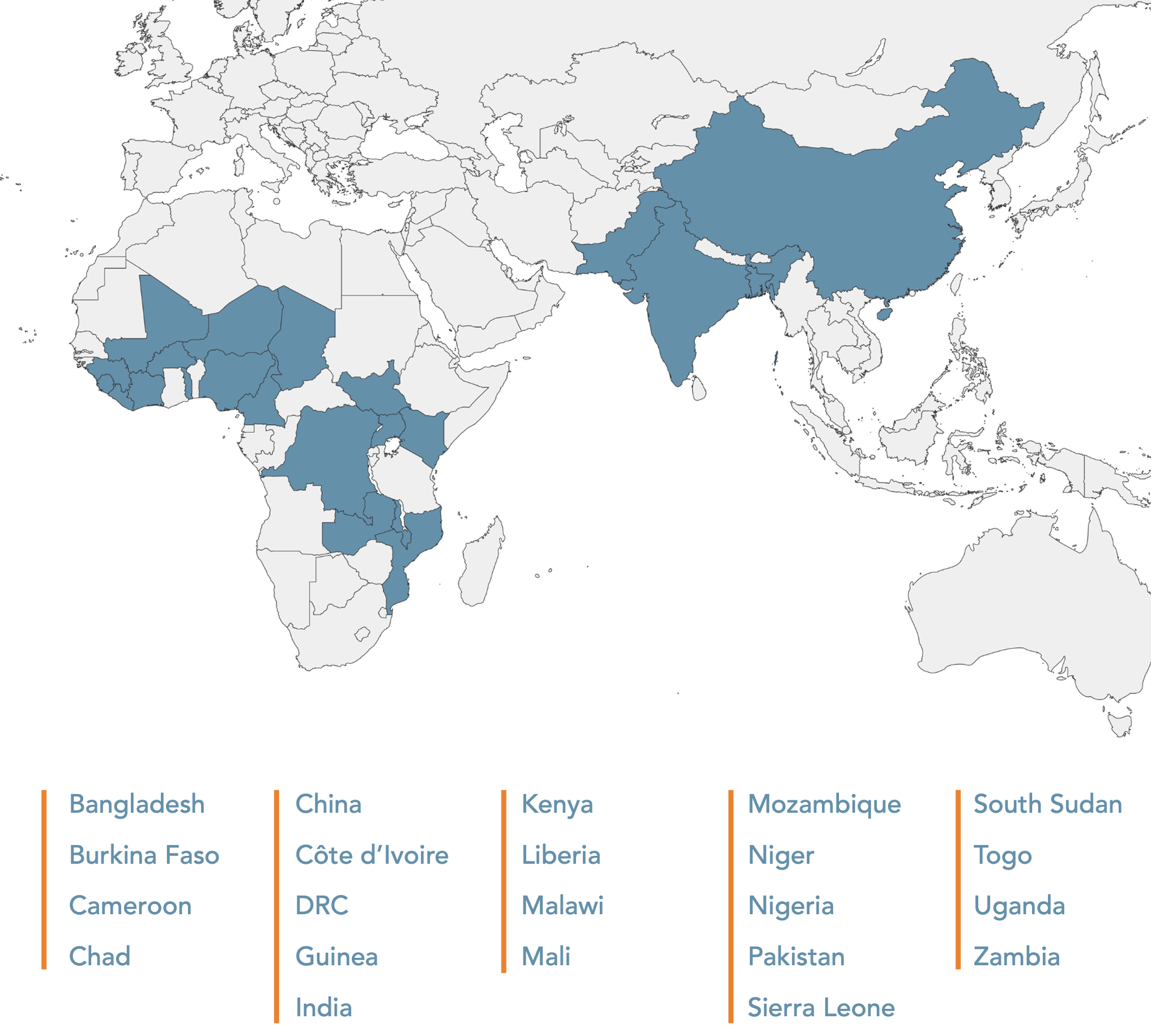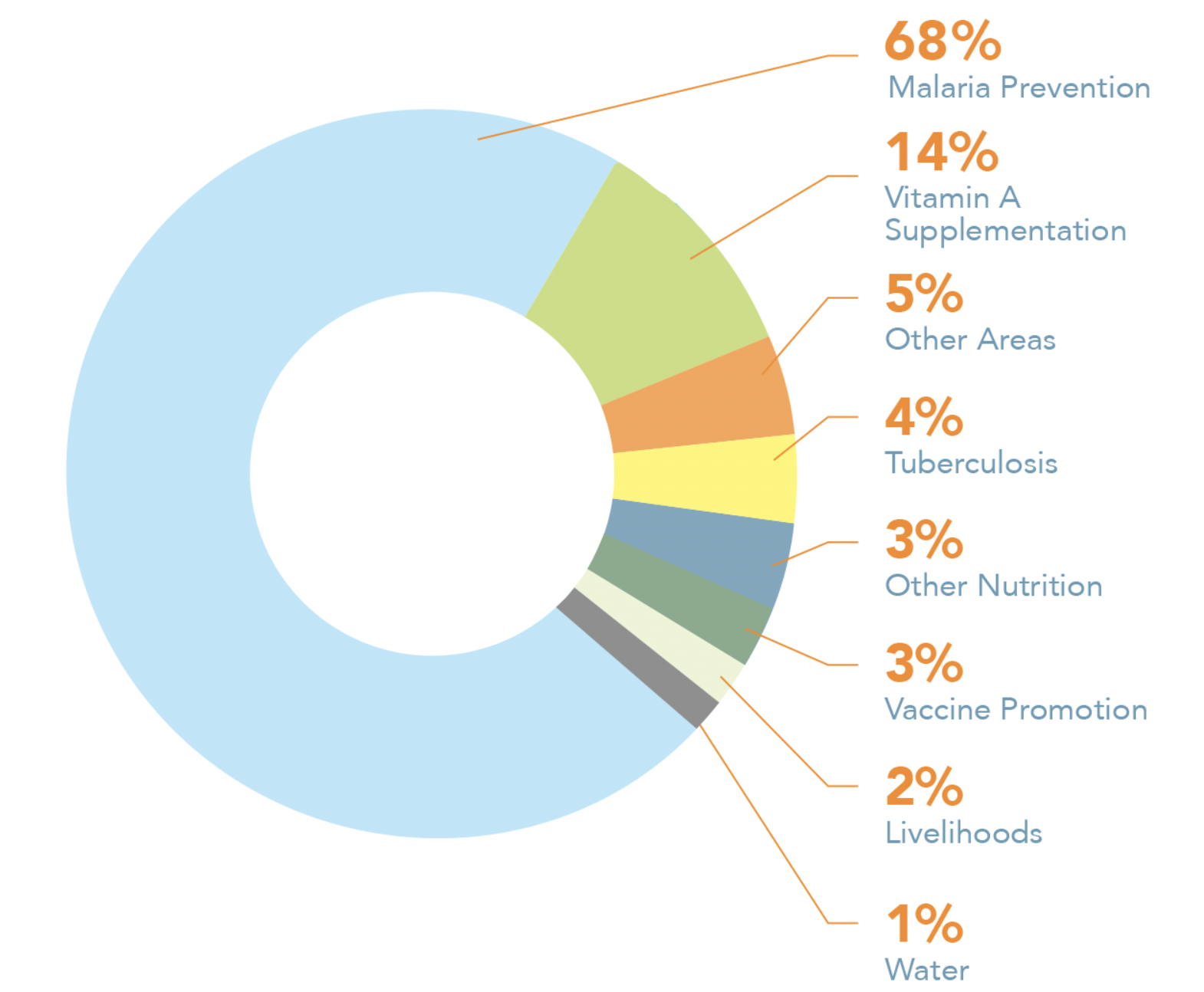Every month we send an email newsletter to our supporters sharing recent updates from our work. We publish selected portions of the newsletter on our blog to make this news more accessible to people who visit our website. For key updates from the latest installment, please see below!
If you’d like to receive the complete newsletter in your inbox each month, you can subscribe here.
GiveWell’s 2024 Metrics Report
We estimate that our 2024 grantmaking will reach around 34 million people and save 74,000 lives.1The calculations for these impact estimates cover only the 17 grants in 2024 focused on reducing mortality and exclude the impacts from our other 38 grants.
This impact, detailed in our 2024 Metrics Report, was made possible by the generosity of more than 30,000 GiveWell donors. During metrics year 2024 (February 2024 to January 2025), GiveWell raised $415 million and directed $397 million to cost-effective programs.2GiveWell’s metrics year runs from February 1 through January 31. Our metrics report is typically published at least six months after the close of the metrics year because we need to collect data on donations we influence from third parties and then cross-check that data to ensure we aren’t double-counting any funds.
In total, we approved 55 grants to 34 organizations working in 22 countries.3Some 2024 grants were not country specific.
We directed our largest share of funding—nearly $270 million—to malaria prevention efforts. This includes the biggest grant in GiveWell’s history, a $96.3 million grant to Against Malaria Foundation supporting insecticide-treated net campaigns across four countries. Additionally, we funded programs addressing other major global health issues like tuberculosis, malnutrition, diarrheal disease, and vitamin A deficiency. We also made grants for programs like kangaroo mother care to reduce infant mortality, in-line chlorination to increase safe water consumption, and vaccine incentives to encourage routine childhood vaccination.
For a detailed look at our funds raised, grants made, operational expenses, donor metrics, and more, check out the full 2024 metrics report. We’re incredibly grateful to our donors for the trust they place in our research and for their partnership in trying to do the most good we can together. We’re excited to see what we can achieve in the coming year!
The Fragile Foundations of Global Health Data
GiveWell’s ability to find and fund highly cost-effective health programs relies on a foundation of credible data. A key source of that data, the Demographic and Health Surveys (DHS) Program, recently had its primary funding from USAID discontinued.4The discontinuation of the DHS program in February 2025 was reported in several news outlets including this article from The Brookings Institution.
In our latest podcast episode, GiveWell CEO and co-founder Elie Hassenfeld and Senior Researcher Adam Salisbury discuss the impact this funding gap could have on GiveWell’s research—and on evidence-based grantmaking across the global health sector.
Elie and Adam cover:
- The surprising source of global health data: In many low- and middle-income countries, basic health metrics like child mortality rates aren’t comprehensively tracked in official registries. The DHS conducts vast, in-person surveys asking women to recall their children’s birth and survival histories to gather key global health metrics.
- Why good data is difficult to get: The DHS is resource-intensive and logistically complex, costing tens of millions of dollars per year to administer in-person, house-to-house surveys in remote areas across more than 50 countries.
- GiveWell’s approach to repairing data gaps: With USAID funding discontinued, GiveWell is considering whether to support these surveys directly, in addition to funding targeted data collection addressing questions the DHS doesn’t cover.
Read our episode summary for more, and subscribe to be notified of our newest episodes.
This episode was recorded on August 13, 2025 and represents our best understanding at that time.
Advancing GiveWell’s Work on Family Planning
Over the past year and a half, GiveWell has been investigating family planning services that increase people’s access to modern contraception and support their preferences around whether and when to have children.
In a recent podcast episode, Elie and Senior Research Associate Dilhan Perera discuss the complexities of evaluating family planning programs, diving into the types of programs we’re considering and key questions we’re working to answer. Read more on this work here.
Grant Spotlight
Our grantmaking supports programs and research that aim to save and improve lives the most per dollar. Here’s a look at one recent example:
Where: Northern Nigeria
What: A program offering small cash incentives to caregivers who bring their children into clinics for routine childhood vaccinations
Who: New Incentives
Amount: $19.1 million
Why it matters: Routine vaccination significantly reduces risk of illness and death from vaccine-preventable diseases. GiveWell’s funding will allow New Incentives to incentivize the vaccination of around one million children, reaching approximately 170,000 children who wouldn’t be vaccinated otherwise.
Why this grant is promising: New Incentives has been a GiveWell Top Charity since 2020, and we have high confidence that New Incentives’ program works. We estimate that this grant will avert over 7,600 deaths.
Funded by: Donations to GiveWell’s Top Charities Fund and All Grants Fund
To learn more, check out the grant page.
Partner Roundup
- Celebrate Giving What We Can’s milestone of 10,000 10% pledgers who have committed to donating 10% of their income to effective charities!
- Learn about the on-the-ground research that’s helping Helen Keller Intl advocate for more realistic community health worker policies.
- See how Malaria Consortium’s new strategy centers health equity in the fight against malaria.
Comments or Questions?
We’re always looking for fresh perspectives on our research. If you have comments or questions on our work, we want to hear from you! Reach out to us at info@givewell.org.
Notes
| ↑1 | The calculations for these impact estimates cover only the 17 grants in 2024 focused on reducing mortality and exclude the impacts from our other 38 grants. |
|---|---|
| ↑2 | GiveWell’s metrics year runs from February 1 through January 31. Our metrics report is typically published at least six months after the close of the metrics year because we need to collect data on donations we influence from third parties and then cross-check that data to ensure we aren’t double-counting any funds. |
| ↑3 | Some 2024 grants were not country specific. |
| ↑4 | The discontinuation of the DHS program in February 2025 was reported in several news outlets including this article from The Brookings Institution. |


